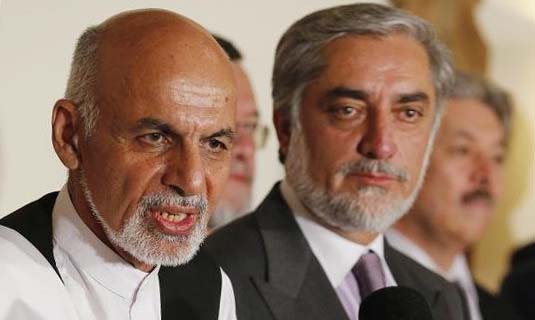KABUL - The unity government would continue to wield “extra-constitutional authority” until a loya jirga is called into session, which needs electoral reforms before conducting parliamentary and district council polls, a member of the newly-created electoral reforms body said on Wednesday.
The power-sharing agreement calls for the convening of a Loya Jirga within two years to consider amending the Constitution to create the position of an executive prime minister.
Electoral reforms are also a major part of the agreement between then presidential candidates Ashraf Ghani and Abdullah Abdullah after last year’s disputed presidential election.
After taking office, President Ghani issued a decree creating an electoral reforms commission, but three months on since the decree was issued, the panel is yet to officially start working.
Gul Ahmad Madadzai, a member of the reforms commission, said electoral reforms were mandatory and delaying tactics in this regard would mean more troubles for the government.
Speaking to Pajhwok Afghan News he said: “A delay in electoral reforms is a big problem for the country because the current government has been created based on a political agreement.”
In order to have a lawful status, he said, the government needed to convene a Loya Jirga and conduct parliamentary and district council elections. “The elections could take place when there are reforms.”
Madadzai linked the delay in starting work by the electoral commissions to wrangling between the unity government leaders. He said parliamentary elections would not take place until the government implemented electoral reforms.
Javed Faisal, deputy spokesman for the Chief Executive Officer (CEO), said they were waiting for the president to direct the electoral reforms commission to start work.
“If anyone wants or doesn’t want, reforms will take place and unless reforms take place, there would be no elections in the country,” he added.
Some Wolesi Jirga members also expressed concerns over the delay in electoral reforms, urging the two leaders to set aside their differences in the larger interest of the country.
Abdul Qader Zazai, a lawmaker, said one of the major differences between the government leaders could be the appointment of the reform commission’s head.
With a strong will, he said, the government could bring reforms immediately and announce a date for next elections.
Ali Akbar Qasemi, another lawmaker, said the reforms commission’s members had been named, but differences over who would head the panel remained between the two leaders.
Without reforms, he said, people’s trust could not be restored over the election process.
MP Shukria Barakzai was first appointed as head of the reforms commission, but due to CEO’s opposition, she was dropped and Jandad Spinghar was picked on her place, but he too is yet to be formally introduced. (Pajhwok)

